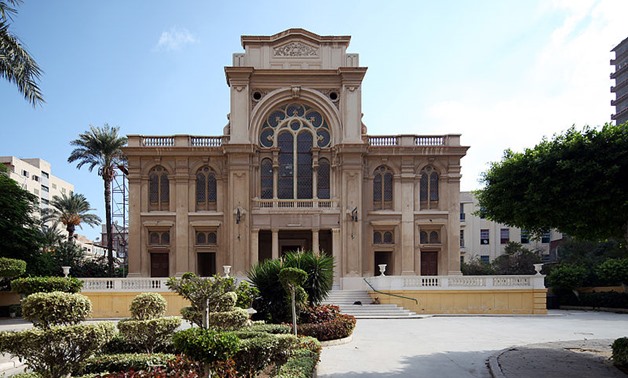
Eliyahu haNavi Synagogue, Nabi Daniel Street, Alexandria, Egypt-- CC via Wikimedia/Roland Unger
CAIRO – 13 April 2018: Egyptian Ministry of Antiquities have finished 35 percent of the restoration works needed for Eliyahu Hanavi Synagogue in Alexandria, said Mohamed Metwali head of the Islamic, Coptic, and Jewish Antiquities Office in Alexandria on Friday.
The restoration works started in August 2017 and would last for a year, he told Egypt Today.
The synagogue is one of the oldest Jewish temples in Egypt; it was established in 1354, but was desecrated when Napoleon Bonaparte's campaign shelled it to create a French military base in the Ottoman territories. However, it was rebuilt in 1850 under the Muhammad Ali Dynasty. It has been closed off by the Egyptian government after a partial collapse in the upper place for women worshippers.
Jews were in Alexandria since its establishment, but at the end of the 19th century, their number reached 4,000 Jews and increased to 18,000 in the beginning of the 20th century. In 1948, however, the number rose to 40,000 people, Egyptian historian Mohamed Abu el-Ghaar mentioned in his book “Jews of Egypt: From Prosperity to Diaspora”, published in 2012.
At the end of the 19th century, thousands of Jews escaped Russia’s October Revolution (Bolshevik Revolution) to Egypt, while in 1930s, other Jews immigrated from Austria, Hungary, Poland, and the city of Thessaloniki in Greece to Egypt, escaping the rise of Nazism in Germany. Most of the Jews in Alexandria were craftsmen and have small and medium trades, Abu el-Ghaar added.
Recently, Egypt’s Ministry of Antiquities has put Jacob Menasce Synagogue in Alexandria, on its list of heritage.
The synagogue was built in 1860 by Baron Jacob de Menasce (1807-1882) in Alexandria. However, “The Jews in Modern Egypt 1914-1952” book by Gudrun Kramer says it was built in 1973.
The synagogue was named after Sephardic Jacob de Manesce seemed to have come to Egypt via Palestine and Morocco in the 18th century. The book adds that he started his career as a banker in Cairo, then he became the private banker of Khedive Ismail. Later, he and Jewish Jacob Qattawi opened a banking house called J.L Menasce et Fils. The house also expanded to have branches in Manchester and Liverpool, then in London, Marseille, Paris and Istanbul.
Menasce was appointed as the baron of the Austro-Hungarian Empire with a Hungarian citizenship. In 1854, the Jewish Community in Alexandria came under the Austro-Hungarian protection; however, most Jews renounced the protection which resulted in its end by 1915, according to “Alexandria was Our Destiny… Based on the Memories of Marie-Luise Nagel”, which is published on the Bibliotheca Alexandria website. In 1869, Menasce and Qattawi were presidents of the Cairo Jewish community, and in 1971, he moved to Alexandria.
Additional reporting by Samar Samir

Comments
Leave a Comment